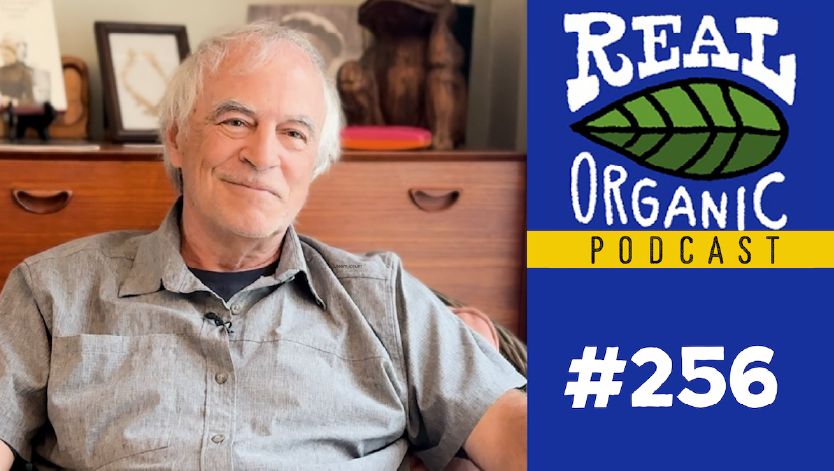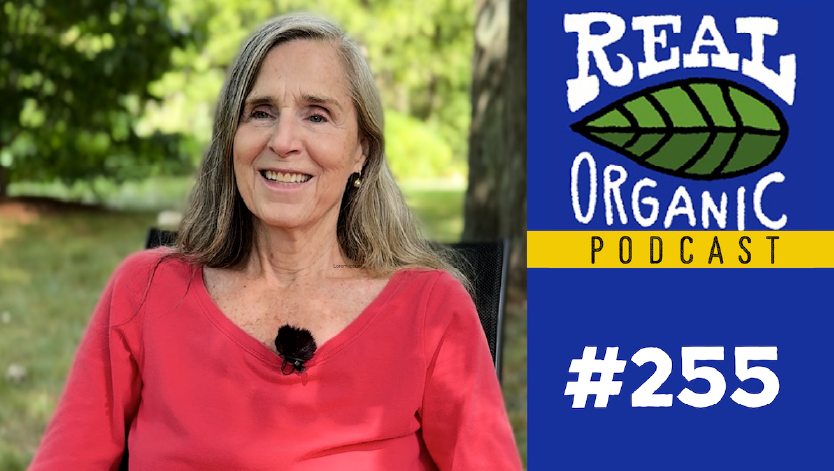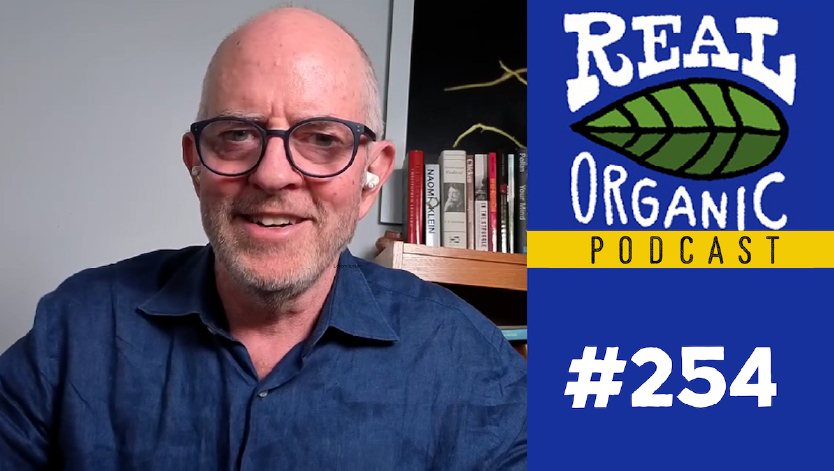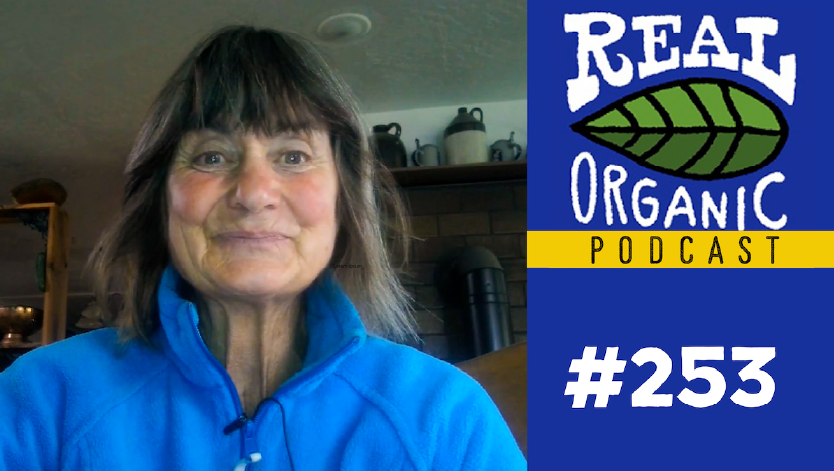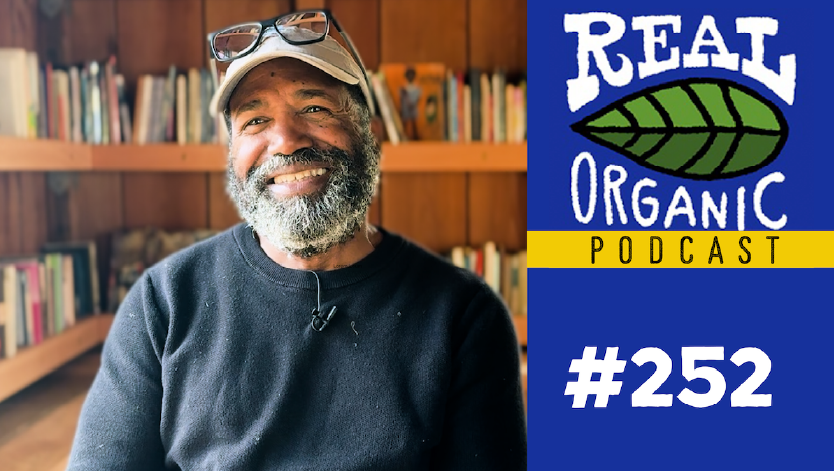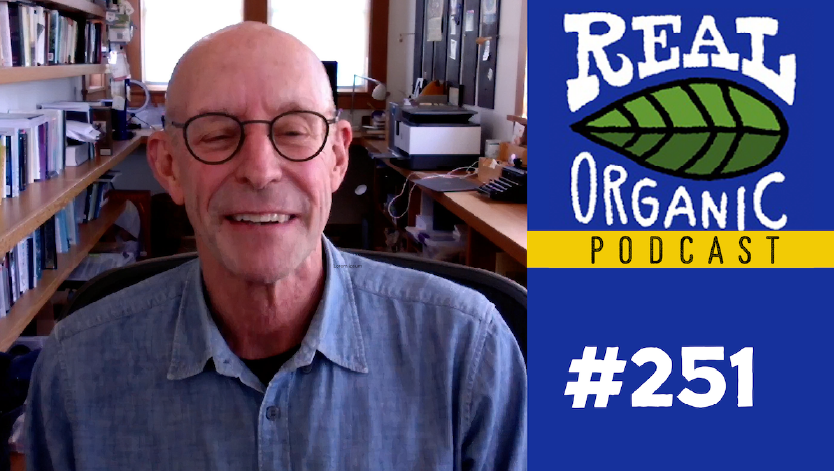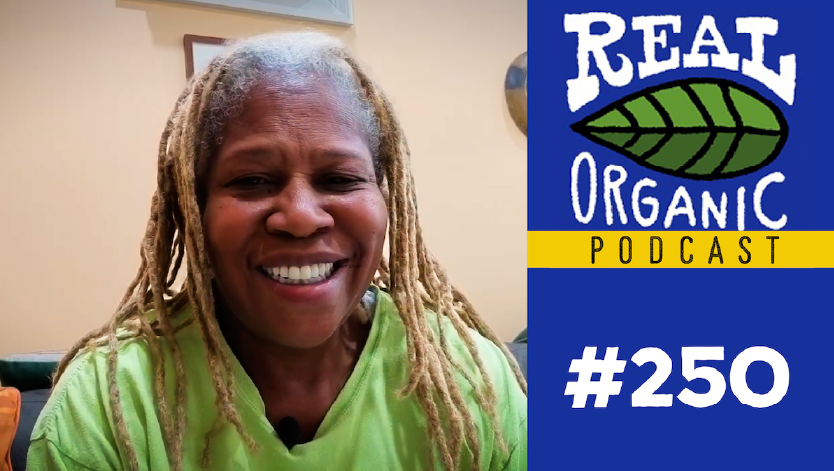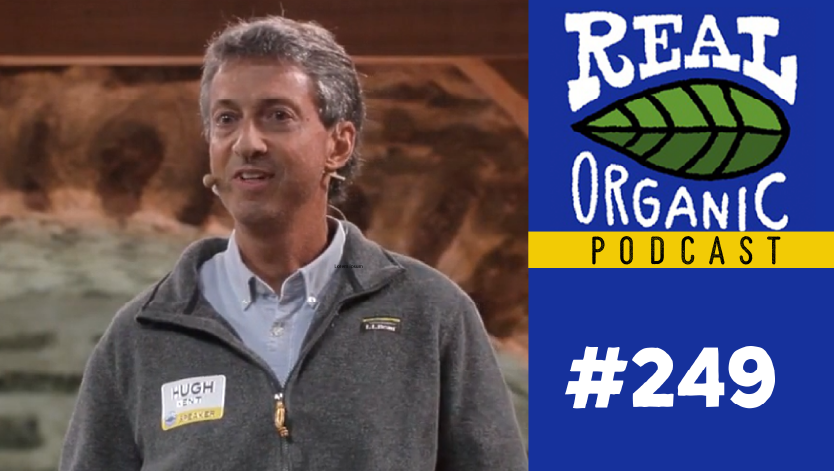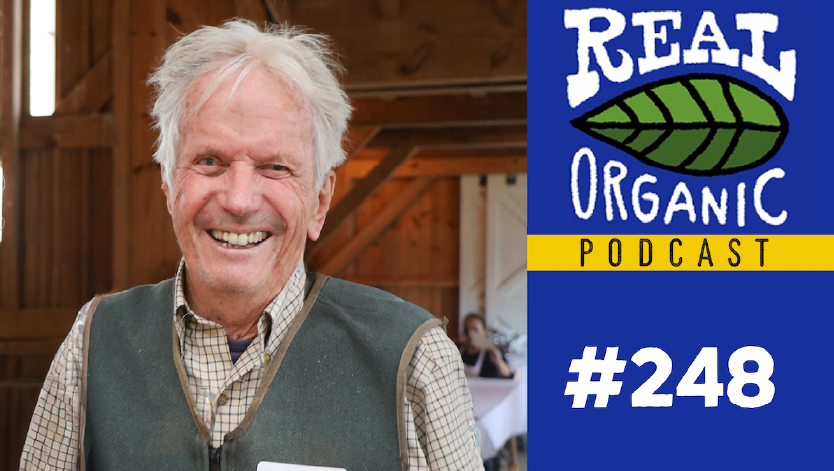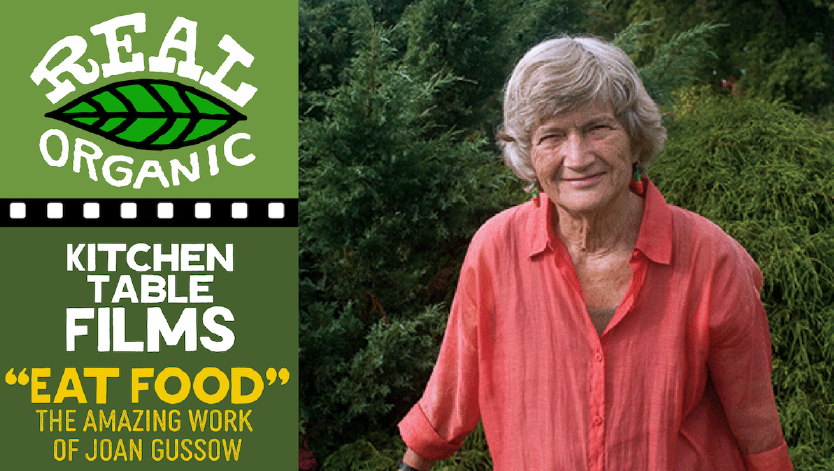Episode #053
Michael Pollan: Antitrust and Democracy at Your Dinner Table
Welcome! You can subscribe and download episodes of our show through your favorite podcast app.
You can also subscribe to receive the video version of each episode on our YouTube channel.
Our Michael Pollan interview has been edited and condensed for clarity.
Dave Chapman (00:01:36):
Welcome to the Real Organic Podcast. And I am very pleased to be talking with Michael Pollan today. Michael needs no introduction. So hello, Michael.
Michael Pollan (00:01:47):
You’re serious about that.
Dave Chapman (00:01:49):
You don’t. People know who you are very well. Okay, I’ll say one thing; I just finished rereading the Omnivores Dilemma and 15 years later, it is still an astonishing book. Congratulations. It is a real tour de force. You said so many important things and you said them very well. I was very impressed by it.
Michael Pollan (00:02:15):
Thanks. I have no idea how well it holds up. I have not had occasion to reread it, although I may have an opportunity because I didn’t do the audio book for that. That was in the days where they had actors do them and it really bugs me. It wrinkles me that it’s not my voice. So I’ve asked my publisher if we could do a new edition that I would read and then I’d get to reread it.
Dave Chapman (00:02:41):
I think that’d be great, actually. You have a good voice for your words. I listened to a lot of it and he did okay. He did, but it would be better.
Michael Pollan (00:02:46):
Yeah, I know. He’s, he’s perfectly fine. But with a book written in the first person you want to hear from the author. Yeah. So, well, thanks for that.
Dave Chapman (00:03:01):
Well, so the book spends a lot of time rather elegantly describing the problems that we face and they’re very real. And I’d like to talk a little bit about solutions, but first I would like to go back and talk about the problems.
One of the things that amazes me is that in my mind, a book like that should just change everything and it does for some people, but it doesn’t for a lot of people. And I’m sure a lot of people who listen to this who would agree with you still haven’t read it and maybe they will now. So the problems of modern agriculture and Big Ag in particular, could you just talk about that for a minute?
Michael Pollan (00:03:49):
Yeah. I mean, I think often, and I’m asked often, about how things have changed since then. And they’ve changed at the level of the conversation, at the level of the culture, at the level of people’s knowledge of the food system. But we still have a food system dominated by a small number of very powerful corporations and no amount of shift in the consumer’s point of view is going to change that I don’t think.
I mean, this is really a matter for the government, for policy, for antitrust enforcement, things like that. And so I’ve come to think that until we get action at that level we’re not gonna see profound change. Concentration is if anything worse than it was in 2006, when that book was published. But there’s a lot more awareness of it, it’s a conversation. There are people in the Biden administration who know that story and are eager to change it.
I’m thinking of Lena Khan, who’s now the head of the Federal Trade Commission. That’s astonishing. When I first started reading her, I mean, you go back and read her Washington Monthly piece on the chicken industry – she nailed it all down. I mean, you know, that chapter could have been in Omnivore’s Dilemma and now she has power to do something about it.
So I’m encouraged by that. The industry will fight back and may well prevail, but we have a shot. So you know, less has changed than I would’ve hoped in this period of time. I do see though that the consumer is a lot more knowledgeable and sophisticated. Obviously the market for alternative if we lump together alternative food and we include organic and local and grass fed or pastured, even if it’s not organic that’s a lot bigger than it was by tens of billions of dollars.
But we know how big the food industry is, and it’s not as a percentage matter, it’s not a huge amount. But you know, I think the conversation has shifted and that there are tons of young people engaged by the food movement who want to get in. I just had office hours with a Harvard Senior who’s like dying to dive in as soon as she graduates. She’s passionate about agriculture. She had one of those transformative experiences working on a farm, you know, Harvard kids didn’t go work on farms before 2006, you know?
And so that’s what I mean when I say there’s change at the level of the conversation as to what the value of farm work or the prestige of farm work, I think has changed. Not that the work’s gotten any easier, but,I think the culture, the culture really had a pretty condescending view of farmers, you know, before the food movement really takes off in the early two thousands. And I think that’s changed. So, I can point to lots of change, but fundamentally we’re in the same system. A handful of companies are feeding us and they’re doing it in a way that’s brutal to workers, brutal to animals, and they’re hiding from us, you know, how our food is produced as best they can.
Dave Chapman (00:07:27):
You know, I live in this world where I’m a small farmer, but I do sell into supermarket chains. And it’s very confusing to me cause I see these two almost alternate economies. And one is the local CSA/ farmer’s market. And I happen to be one of the few still selling into the maw of the big chains. But I see the big chains are being owned by fewer and fewer companies now. I mean, it really is, is amazing.
Michael Pollan (00:07:59):
Well, when I wrote Omnivore’s Dilemma, Whole Foods was the big, bad actor in organic. And, you know, there was a very critical chapter about how they had diluted the vision of organic and how they were playing with the image of small agriculture when they weren’t actually buying from small agriculture. And now they’re part of Amazon. And they’re small in the organic market compared to Walmart. Walmart’s the biggest producer now.
And you know, you can argue that’s a good or bad development. I mean, that’s a lot more organic food being sold. It’s a lot more people who aren’t “elite” being exposed and you know, receiving organic food. There’s a benefit to that. Yes. I mean, it’s very hard on the farmers. But you know, it’s funny, I’ll often ask audiences, “how would you feel if McDonald’s went all organic?” And like invariably people, boo, cause it’s an offensive idea at some basic level. The spirit of organic just doesn’t have room for McDonald’s.
But you know, how many tens of thousands of acres of cornfields won’t be sprayed with herbicide? You know, the reduction in residues of pesticides in the diet of millions of people? I mean, there are real benefits, right? You know, democratizing things often means diluting them. It’s just a kind of fact of life. But on the other hand you still need people holding up the ideal on the standard and defending that as powerfully as they can. Cause otherwise, just everything becomes the least common denominator.
Dave Chapman (00:09:55):
One of the things that is said to me is that the Real Organic Project is divisive. This was said to me a couple weeks ago by Danone and said to me by another big corporate player, but by friends too. And so my question is, is it divisive to say the truth?
Michael Pollan (00:10:21):
Sometimes it is. It depends. It depends what world are you speaking into? Where are you demeaning? Politics is often divisive. You know, it’s a weird criticism. I think the dilemma that’s faced by the critics of organic within organic is that there’s a very precious brand here that all benefit from. Some people may be hiding behind it practices that don’t deserve to be called organic. Other people are doing it the way it should be done in the spirit of organic.
But the fight itself can do damage to the brand if it’s not done right. I mean, you know, and that’s why it’s not inevitable that it be divisive, but I think you have to pick your battles carefully and you have to stand on ground that makes sense to people like soil. Soil is like so central to, you know.. If you’re defending the role of soil in organic, you are defending the heart and soul of organic.
But you can imagine there are critics that are simply against bigness or you know, there’s other groups that have come along over the years that have thrown thrown stones at organic players. And that can be divisive. So I think it’s about choosing your battles. And they have to be battles that can be, you know, with the story behind them that isn’t just about big versus little, but it is about fundamental principles. And that’s why I think soil is a very important ground to stand on.
Dave Chapman (00:12:11):
Yeah. Soil and, and of course the other one that we really embrace is pasture for animals. Outdoors.
Michael Pollan (00:12:19):
Yeah, animals, eating their proper diet and living where they’ve evolved to live, which is to say cows on grass. I think that’s also a really important ground to stand on.
Dave Chapman (00:12:35):
The, at the time, the head of the National Organic Program once said to me that if the Animal Welfare Reform that he was trying to get put through passed and was enacted, it would lead to the de-certification of three quarters of the organic eggs in America. That’s a big deal.
Michael Pollan (00:12:54):
Yeah, that is a big deal.
Dave Chapman (00:12:56):
And he said it, cause I said, “if we don’t stop hydroponic now it’ll be too big to fail.” He said, “don’t tell me about too big to fail. We’re not afraid we’re going there.” And of course, six years later he’s gone, the reform is gone, the CAFOs are still here. So they were too big to fail. And that was a very political thing that they killed that. It was actually passed by…
Michael Pollan (00:13:23):
But,they’re gonna kill the golden.. you know, this is the goose that laid the golden egg, right? And I think you have to be careful. At a certain point, the consumer will turn on this brand and say “this isn’t worth it.” So I, I think it’s a dangerous game. I mean, it brings down everybody.
But that’s one of the reasons you see so much interest in regenerative agriculture and in that label or beyond organic. I mean there are, you know, there is an effort to establish a new beachhead with a better standard.


